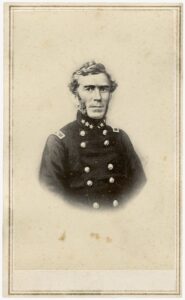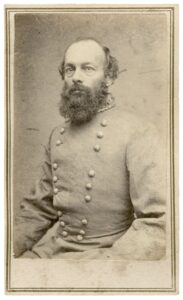5:30
Commentary
Whatever happens at Gov. Andy Beshear’s second inauguration, odds are federal soldiers won’t run him out of town.
During the Civil War, Confederate troops captured Frankfort, the only capital of a loyal state to fall to the enemy during America’s most lethal conflict. The rebels’ advent forced Unionist Gov. James F. Robinson and the Union-majority General Assembly to escape to Louisville.

In the early afternoon of Oct. 4, 1862, a rainy Saturday, rebel Gens. Braxton Bragg and Edmund Kirby Smith arranged the inauguration of Bourbon countian Richard Hawes as the state’s Confederate “governor.” His tenure was over by sundown.
Back in the fall of 1861, after the freely-elected pro-Union state legislature abandoned neutrality and embraced war against the Confederacy, some disgruntled secessionists gathered behind rebel lines in Russellville, created a sham Confederate “provisional government” and named George W. Johnson, a Scott countian, as governor.
In early 1862, the rebel “government” abandoned Kentucky with the retreating Confederates. Johnson, fighting as a volunteer private soldier, died of his wounds after the Battle of Shiloh. The government-in-exile named Hawes to replace Johnson.

Bragg and Kirby Smith had attacked Kentucky from Tennessee, hoping for a warm welcome and a rush of enlistments. Relatively few men donned Confederate gray, and border slave state Kentucky stuck by the Stars and Stripes.
No matter, Bragg and Kirby Smith went ahead with inaugural ceremonies at the old Capitol. Spectators included rebel sympathizers and the town’s occupiers in gray uniforms.?
In introducing Hawes, Bragg promised that Confederate forces would “yield appropriate deference to the civil authorities,” and defend Kentucky and Kentuckians “with the discipline and valor for which they have been preeminently distinguished.”
Hawes declared that “the provisional government driven from the State by the overpowering force of Federal arms, has returned under the protection of the Confederate army, and I propose to enter upon my duties as chief magistrate of Kentucky.”
He denounced Abraham Lincoln’s “Abolition war” and his anti-slavery policies — notably the president’s preliminary Emancipation Proclamation of Sept. 22, 1862. Though the proclamation didn’t apply to loyal slave states like Kentucky, nearly every white Kentuckian hated it. (The Kentucky-born Lincoln received only 1,366 Kentucky votes in the presidential election of 1860.)

It’s unclear if Hawes was able to take the oath of office because Union troops were fast approaching Frankfort. Hawes, Bragg, Kirby Smith and the Confederate troops beat a hasty retreat.
On Oct. 8, Bragg’s forces collided with the Army of the Ohio led by Gen. Don Carlos Buell (namesake of old Buell Armory on the University of Kentucky campus) at Perryville. Tactically, the bloodiest battle ever fought on Kentucky soil, it was a draw. But after Perryville, the Confederates retreated into Tennessee. Never again were the rebels able to menace Kentucky in such strength, although cavalry raiders and guerrillas plagued the state until the war ended in 1865.
The Louisville Journal, the state’s largest and most influential Unionist newspaper, lampooned the inaugural festivities. “There has never been so broad a farce played upon the world’s stage as the installation of Richard Hawes as the Provisional Governor of Kentucky,” the Journal jabbed. (It seems unlikely Beshear will be so bashed in print after he is sworn in on the steps of the present-day Capitol.)
Editor George D. Prentice, who likely fired the verbal barrage, was fond of Shakespearian allusions. He compared Hawes to Christopher Sly, a drunken tinker in “The Taming of the Shrew.” In the play, a rich nobleman duped the besotted Sly into thinking he was a great lord who had been asleep for 15 years.
“…? What adds to the intensity of the burlesque is that Hawes himself was taken in, and really fancied himself the executive officer of the State, just as his prototype was ‘bestraught’ with the civilities of the sportive lord who played the trick upon him.”
The Journal poured it on “poor maudlin Hawes” who “could not appreciate the mockery of the scene, but took it all for serious earnest. In a few short hours, however, he awoke to a realizing sense of the stupendous humbug, and the tinker Christopher Sly returned to his wallow.”
Prentice’s paper also blasted Bragg who “carried his puppet off with him, and he will be pulling the wires of Dickey Hawes again, if ever an opportunity presents itself.” Yet, should the rebel general reflect “upon the blatant tone of his Frankfort address, a feeling of mortification must come over him, if he is susceptible of such impressions, to think how the bubble he filled with gas and distended before the rebel sympathizers at the State capital collapsed so suddenly.”???
GET THE MORNING HEADLINES.
Our stories may be republished online or in print under Creative Commons license CC BY-NC-ND 4.0. We ask that you edit only for style or to shorten, provide proper attribution and link to our website. AP and Getty images may not be republished. Please see our republishing guidelines for use of any other photos and graphics.
Berry Craig
Berry Craig, a Carlisle countian, is a professor emeritus of history at West Kentucky Community and Technical College in Paducah and the author of seven books, all on Kentucky history. His latest is "Kentuckians and Pearl Harbor: Stories from the Day of Infamy" which the University Press of Kentucky published. He is a freelance journalist, a member of the American Federation of Teachers and a longtime union activist.






Berry Craig